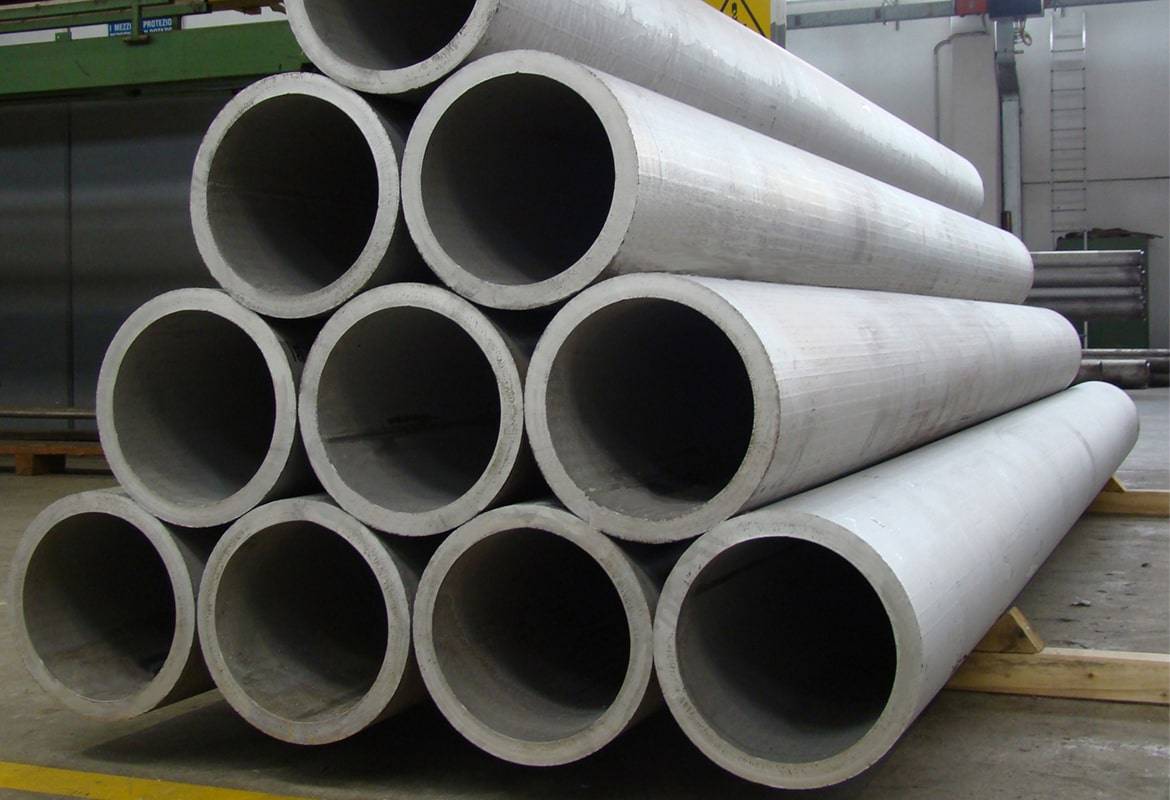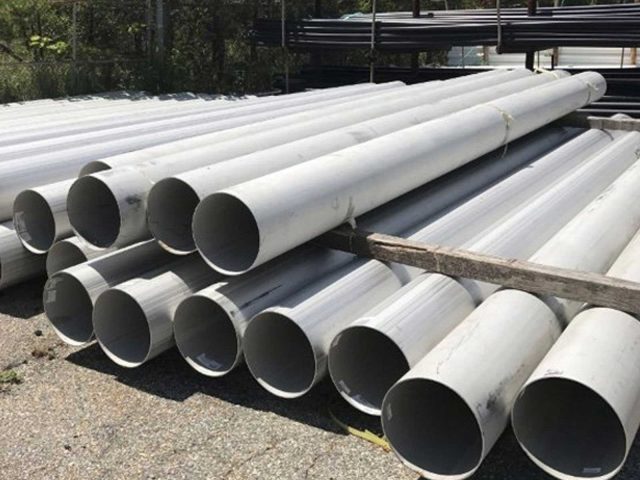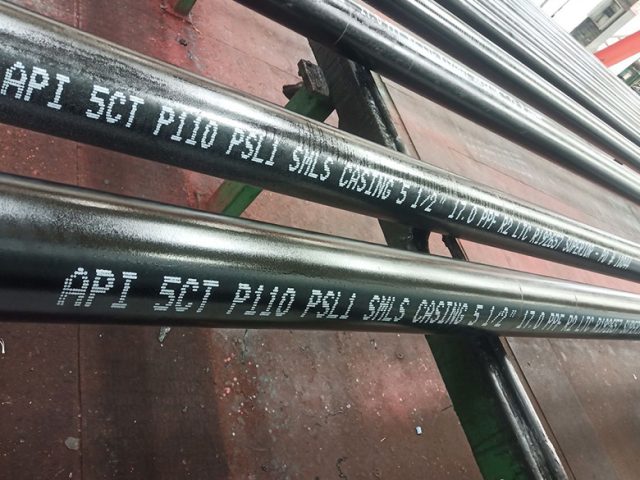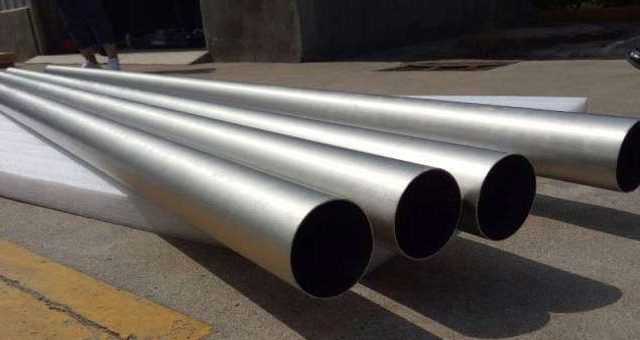Nickel Alloy Steel Heat Exchanger Pipe

Nickel Alloy Steel Heat Exchanger Pipes
Overview
Nickel alloy steel heat exchanger pipes are essential components in heat transfer systems, specifically designed to withstand high temperatures and corrosive environments. These pipes are crafted from nickel-based alloys, which offer excellent thermal conductivity, corrosion resistance, and durability. Nickel alloy steel heat exchanger pipes are widely used in industries such as chemical processing, oil and gas, petrochemical, and power generation, where efficient heat transfer and resistance to corrosion are paramount.
Salient Features
- Thermal Conductivity: Nickel alloy steel pipes exhibit excellent thermal conductivity, enabling efficient heat transfer within the heat exchanger system. This property ensures optimal performance and energy efficiency.
- Corrosion Resistance: Nickel-based alloys are renowned for their exceptional corrosion resistance, even in highly corrosive environments. These pipes can withstand the effects of acidic, alkaline, and chloride-containing media, making them ideal for challenging applications.
- High Temperature Strength: Nickel alloy steel pipes retain their mechanical strength and integrity even at elevated temperatures. This characteristic is crucial in heat exchanger systems operating under extreme heat conditions.
- Low Thermal Expansion: Nickel alloys have a relatively low coefficient of thermal expansion, minimizing dimensional changes with temperature fluctuations. This property helps maintain the structural stability of the heat exchanger system.
- Variety of Alloys: Nickel alloy steel heat exchanger pipes are available in a wide range of alloys, including Inconel, Hastelloy, Monel, Alloy 20, and more. Each alloy offers unique properties and characteristics suited to different operating conditions.
- Longevity and Reliability: Due to their corrosion resistance and high temperature strength, nickel alloy steel pipes have a long service life and provide reliable performance. This reduces the need for frequent maintenance or replacement, resulting in cost savings for industries.
Types of Nickel Alloys
| ASTM/AISI | UNS No | EN | DIN | JIS |
| Incoloy 800 | N08800 | 1.4558 | X2NiCrAlTi3220 | NCF2B |
| Incoloy 800H | N08810 | |||
| Incoloy 825 | N08825 | 2.4858 | NiCr21Mo | NCF825 |
| Inconel 600 | N06600 | 2.4816 | LC-NiCr12Fe | NCF1B |
| Hastelloy B | N10001 | N12MV | ||
| Hastelloy B2 | N10665 | 2.4617 | NiMo28 | |
| Hastelloy C | ||||
| Hastelloy C276 | N10276 | 2.4819 | NiMo16Cr15W | NW 0276 |
| Hastelloy C4 | N06455 | 2.461 | ||
| Hastelloy C22 | N06022 | 2.4602 | ||
| Inconel 625 | N06625 | 2.4856 | NiCr22Mo9Nb | |
| Inconel 718 | N07718 | 2.4668 | ||
| Monel 400 | N04400 | 2.436 | NW 4400 | |
| Nickel 200 | N02200 | 2.406 |
Grade Description and Applications of Nickel and Nickel Alloys
| Rade | Description | Applications |
| High Temp. Nickel Alloys | Designed to provide unique strength and/or corrosion properties at elevated temperatures. Properties such as high strength, high creep resistance, resistance to softening, or resistance to metal loss at high temperatures from oxidation, sulfidation, or carburization are present. | |
| Corrosion Resistant Nickel Alloy | These alloys are intended for applications in the chemical processing, petroleum refining, marine, pollution, and waste control industries where common austenitic stainless steels may not provide adequate corrosion protection. | |
| Alloy 330 | An austenitic nickel-iron-chromium alloy developed to provide excellent resistance to carburizing and oxidizing atmospheres at elevated temperatures. | Nickel-Iron-Chromium alloy offering Industrial furnaces and components, excellent resistance to oxidation and chemical processing equipment, power carburization at elevated temperatures generation and ore processing |
| Alloy 400 | Nickel-Copper alloy with high strength and excellent corrosion resistance | Marine engineering, Chemical and hydrocarbon processing equipment, Valves, Pumps, Shafts, Fittings, Fasteners, Heat exchangers |
| Alloy 600 | Oxidation resistance at high temperatures | Furnace components, Chemical and food processing, Nuclear engineering |
| Alloy 625 | Nickel-Cr-Moly+Niobium to provide high strength | Chemical processing, Aerospace and marine engineering, Pollution control equipment, Nuclear reactors |
| Alloy 800/800H/800HT | Nickel-Iron-Chromium alloy with high creep strength | Chemical and petrochemical processing, Power plants for super-reactor and reheater tubing, Industrial furnaces, Heat treating equipment |
| Alloy 825 | An austenitic nickel-iron-chromium alloy developed for corrosion resistance in both oxidizing and reducing environments. | Air pollution control, chemical and petrochemical, food process, nuclear, offshore oil and gas production, ore processing, petroleum refining, steel pickling and waste disposal. |
| Alloy C276 | Nickel-Moly-Cr alloy with tungsten | Pollution control, Chemical processing, Pulp and paper production, Waste treatment |
Nickel Alloy Steel Pipe Mechanical Strength
| Density | Elongation | (0.2%Offset) Yield Strength | Melting Point | Tensile Strength |
| 8.9 g/centimeter3 | 45 % | MPa – 148 and Psi – 21500 | 1446 °C (2635 °F) | MPa – 462 and Psi – 67000 |
Nickel Pipe Chemical Composition
| ALLOY | NI | MN | FE | SI | CU | C | TI |
| NI 205 | Min 99.6 | Max 0.20 | Max 0.2 | Max 0.10 | Max 0.10 | Max 0.05 | Max 0.05 |
| NI 201 | Min 99.2 | Max 0.30 | Max 0.2 | Max 0.10 | Max 0.20 | Max 0.05 | Max 0.10 |
| NI 200 | Min 99.2 | Max 0.30 | Max 0.2 | Max 0.10 | Max 0.20 | Max 0.10 | Max 0.10 |
| NI 205 LC | Min 99.6 | Max 0.20 | Max 0.2 | Max 0.10 | Max 0.10 | Max 0.02 | Max 0.05 |
Physical Properties Of Nickel Alloy Tube
| LOY | ELECTRICAL RESISTIVITY , AT 20°C | THERMAL , CONDUCTIVITY | NICKEL ALLOY DENSITY | THERMAL LINEAR , EXPANSION COEFF. , (20-95 °C) |
| ΜΩ-CM | W/M K | G/CM³ | 10-6/K | |
| NI 205/205 LC | 8.9 | 75.00 | 8.89 | 13.3 |
| NI 200/201 | 9 | 70.20 | 8.89 | 13.3 |
Nickel Alloy Steel Pipe Mechanical Strength
| Density | Elongation | (0.2%Offset) Yield Strength | Melting Point | Tensile Strength |
| 8.9 g/centimeter3 | 45 % | MPa – 148 and Psi – 21500 | 1446 °C (2635 °F) | MPa – 462 and Psi – 67000 |
Equivalent Grades Of Nickel Alloy Seamless Tubes
| Alloy | ASTM Specification | Material-No. | DN-Trade Name | UNS-No. | DIN Specification |
| Nickel 201 | ASTM B160 | 2.4068 | NR-Nickel 99 | N02201 | DIN 17740 |
| Ni99.6 | 2.4060 | BR- Nickel 99.6 | DIN 17740 | ||
| Nickel 200 | ASTM B160 | 2.4066 | R-Nickel 99.2 | N02200 | DIN 17740 |
| LC-Ni99.6 | 2.4061 | NR-Nickel 99.6 | DIN 17740 |
Applications
Nickel alloy steel heat exchanger pipes find applications in various industries and processes, including:
- Chemical Processing: These pipes are used in chemical plants for heat transfer in processes involving corrosive chemicals and high temperatures.
- Oil and Gas: Nickel alloy steel pipes are employed in the oil and gas industry for heat exchange in refining, petrochemical processes, offshore platforms, and gas processing plants.
- Petrochemical: Heat exchanger systems in petrochemical plants rely on nickel alloy steel pipes to handle corrosive fluids and high-temperature environments.
- Power Generation: These pipes are used in power plants for heat transfer in boilers, condensers, and other heat exchanger applications.
- Desalination: Nickel alloy steel pipes are utilized in desalination plants for heat transfer in the production of fresh water from seawater.
Manufacturing Range
Nickel alloy steel heat exchanger pipes are available in a wide range of sizes, shapes, and configurations to suit specific application requirements. The manufacturing range typically includes:
- Pipe Size: Nickel alloy steel heat exchanger pipes are manufactured in various nominal pipe sizes (NPS), ranging from 1/8″ to 48″ or even larger, depending on the specific project requirements.
- Wall Thickness: The wall thickness of these pipes can vary from standard schedules (SCH) such as SCH 5, SCH 10, SCH 40, to heavier schedules like SCH 80, SCH 160, or custom thicknesses as per the application needs.
- Pipe Length: Nickel alloy steel pipes are available in standard lengths of 20 feet or 40 feet. Custom lengths can also be manufactured as per project specifications.
Testing & Inspection
Nickel alloy steel heat exchanger pipes undergo rigorous testing and inspection procedures to ensure their quality and performance. Common tests and inspections include:
- Chemical Composition Analysis: This test determines the chemical composition of the alloy, ensuring it meets the required specifications.
- Mechanical Properties Testing: Various tests, including tensile strength, yield strength, and elongation, are conducted to evaluate the mechanical properties of the pipes.
- Non-Destructive Testing (NDT): NDT methods, such as ultrasonic testing (UT) and radiographic testing (RT), are employed to detect any internal or surface defects in the pipes.
- Dimensional Inspection: The pipes are checked for their dimensions, including outer diameter, wall thickness, and length, to ensure compliance with the specified requirements.
- Corrosion Resistance Testing: Nickel alloy steel pipes undergo corrosion resistance testing to evaluate their ability to withstand corrosive environments.
- Visual Inspection: A visual inspection is carried out to detect any visible defects or imperfections in the pipes.
These tests and inspections ensure that the nickel alloy steel heat exchanger pipes meet the required quality standards and are fit for the intended application.
In conclusion, nickel alloy steel heat exchanger pipes are indispensable components in heat transfer systemsFAQ
- What are the advantages of using nickel alloy steel heat exchanger pipes?
Nickel alloy steel heat exchanger pipes offer excellent thermal conductivity, corrosion resistance, high temperature strength, and longevity. They are versatile in terms of available alloys and are suitable for a wide range of applications. - Which industries commonly use nickel alloy steel heat exchanger pipes?
Nickel alloy steel heat exchanger pipes are commonly used in industries such as chemical processing, oil and gas, petrochemical, power generation, and desalination. - What types of alloys are used in manufacturing nickel alloy steel heat exchanger pipes?
Nickel alloy steel heat exchanger pipes can be manufactured from alloys such as Inconel, Hastelloy, Monel, Alloy 20, and more. Each alloy offers unique properties suitable for different operating conditions. - What range of sizes are available for nickel alloy steel heat exchanger pipes?
Nickel alloy steel heat exchanger pipes are available in various nominal pipe sizes (NPS), ranging from 1/8″ to 48″ or larger, depending on the project requirements. - What testing and inspection procedures are performed on nickel alloy steel heat exchanger pipes?
Nickel alloy steel heat exchanger pipes undergo tests such as chemical composition analysis, mechanical properties testing, non-destructive testing (NDT), dimensional inspection, corrosion resistance testing, and visual inspection to ensure quality and performance.
Remember, for any specific questions regarding your project or requirements, it is always recommended to consult with a professional in the field.




